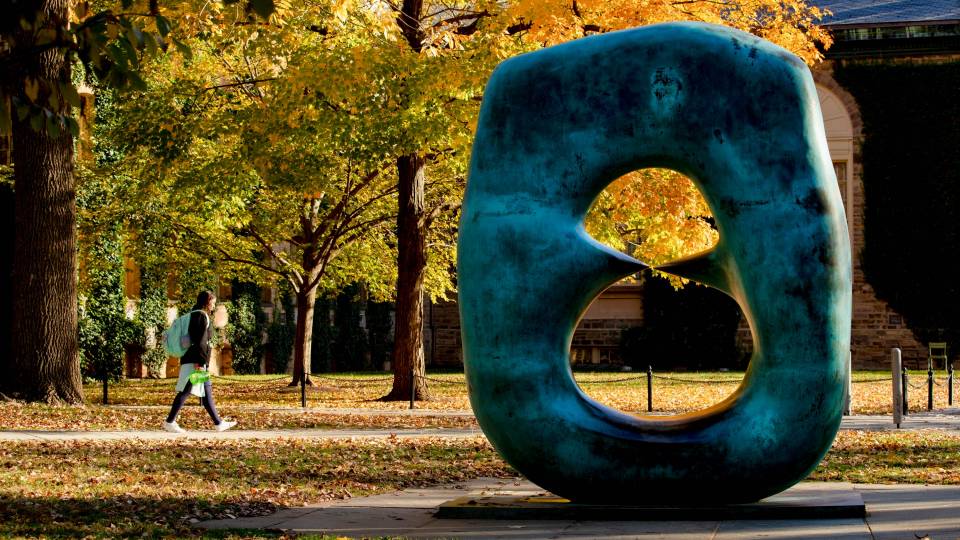From the Sept. 10, 2006, Princeton Weekly Bulletin
University sophomore Callie Lefevre’s plans to spend the summer learning Arabic and immersing herself in the culture of a city she loves, Beirut, were shattered in mid-July when Israeli forces launched attacks against Hezbollah in Lebanon.
Five days after the fighting began, Lefevre and classmate Emily Norris — who were halfway through an intensive Arabic program at the American University of Beirut — were evacuated from the Lebanese capital by International SOS, a firm with which Princeton has contracted to provide emergency services for overseas travelers.
The conflict in Lebanon and Israel — where several Princeton undergraduate and graduate students were studying when the fighting began — posed the most dramatic test of the University’s emergency preparedness plans for overseas travelers, which have been strengthened in the years following the Sept. 11, 2001, terrorist attacks.
“It was a learning experience, and I certainly don’t regret going,” Lefevre said. “Actually, I can’t wait to go back [to Beirut]. If anything, I know I should go back while I’m still a Princeton student because Princeton will take care of me.”
Taking stronger measuresIn 2004, Princeton contracted with International SOS to enhance the services available to students, faculty, staff and other affiliates — including trustees and alumni — on University-sponsored international travel. The two undergraduates in Lebanon this summer were the only Princeton travelers who have been evacuated for security reasons by International SOS, but the firm has assisted other students and faculty members with medical issues and with sorting out travel problems for those who lost a passport or missed a flight, said Megan Adams, the University’s director of risk management.
Princeton recently enhanced its International SOS coverage to make services available to dependents of those traveling on behalf of the University, as well as to enable students, faculty and staff to purchase coverage for personal travel. The organization also offers pre-travel services, including security and health-risk assessments of countries where University community members will be traveling.
Developing stronger emergency measures is critical as students have demonstrated greater interest in taking courses, accepting internships and engaging in service projects abroad in the years following the Sept. 11 attacks, said Nancy Kanach, associate dean of the college and director of Princeton’s study abroad program.
In 2005-06, 409 Princeton undergraduates studied abroad in programs during the academic year and the summer, up from 301 students three years earlier. This summer, 72 students participated in the University’s International Internship Program, compared to 49 in 2003.
“We talk to students about how best to prepare for their time abroad, especially in areas where they may be confronted with a lot of anti-American sentiment,” Kanach said. “Most programs complement our on-campus orientation with one on-site that also covers issues of health and safety. We believe that by the time students begin their program abroad, they will be prepared for the experience.”
Kanach noted that institutions around the world have improved their emergency practices for study abroad programs in recent years. In instances where Princeton students have been in areas where trouble arose, such as the train attacks in Madrid in 2004 and the riots in France in 2005, Kanach said she heard quickly from the host programs that the students were safe and had been instructed to contact their families.
Responding to troubleWhen fighting broke out in Lebanon, Kanach reached out to the two undergraduates in Lebanon, as well as four undergraduates in academic and internship programs in Israel. The students in Israel stayed until the end of their programs and left the country without need for evacuation, she said.
Lefevre said that within a day of the first bombing she and Norris received e-mails from Kanach and from Nancy Coffin, their first-year Arabic instructor in Near Eastern studies. Kanach checked on their safety and reminded the students that Princeton could help them evacuate.
As the conflict escalated, Kanach remained in constant contact with International SOS. Lefevre’s mother, Sherry, said Kanach called her frequently with updates on options for her daughter to evacuate. “She was calling to gently make this [option] available but certainly not to interfere with a parent’s prerogative to make the decision,” Sherry Lefevre said.
After considering whether to wait for U.S. government assistance or to remain in Beirut through the end of her academic program, Lefevre and her mother decided that she should leave with International SOS, which transported Lefevre and Norris by van to Damascus, Syria. From there they flew to Cyprus and, ultimately, back home.
Kanach had initially rejected Lefevre’s request for funding to study in Lebanon this summer, citing the University’s policy of not supporting travel to countries on the U.S. State Department’s travel warning list. But Lefevre had her family’s permission and made a strong case for the educational benefits of studying in Beirut.
“In such cases, we look very carefully at a student’s academic purpose in going abroad and look for a compelling reason that requires traveling to a particular destination,” Kanach said. “We make sure that they and their parents are aware of and assume the known risks involved and realize as well that there may be other unforeseeable risks.”
Lefevre, who had studied two years earlier in Beirut and had family friends there, said, “I wanted the summer to be not just about learning Arabic academically, because I could have stayed in the States to do that, but I really wanted to get the feel for living in that city.”
Sherry Lefevre, who is a 1974 Princeton graduate, said, “The result of this experience for Callie will be a greater love of her university. When she thinks of who protected her, she will think her mother showed extreme concern and her university did, too.”
In addition to the two undergraduates, two Princeton graduate students were in Lebanon when the fighting broke out. Efstratios Sourlagas, a doctoral candidate in anthropology, said he heard from his department and from the Graduate School once the bombing began. Sourlagas, a Greek citizen, said he received offers from University officials to help him evacuate with U.S. citizens, but he decided to stay.
“I certainly feel that Princeton’s generous efforts … were timely and helpful,” Sourlagas said. He intends to remain in Lebanon for at least another year and incorporate this summer’s conflict into his research, which focuses on how Christians and Muslims rebuild their lives and communities in the aftermath of war and violence.
In addition to contacting the graduate students in Lebanon during the conflict, the Graduate School e-mailed all graduate students who are citizens of Israel or Lebanon, said David Redman, associate dean for academic affairs. “Our message said we were very upset about the situation in the country and the region, that the office stood ready to help, and that for new incoming students whose travel plans may have suffered some setback we were prepared to be flexible with regard to arrival time and to discuss, if needed, a delayed arrival or even a deferral for a term,” Redman said.
Staying preparedIn today’s global environment, University officials continue to assess their practices related to international travel to remain as prepared as possible. One group of representatives from across the University — including academic departments and the offices of the vice president for campus life, dean of the college, dean of undergraduate students, risk management, general counsel, compliance and University Health Services — is currently reviewing practices related to student-initiated international travel to find areas for further improvement.
“We are looking at issues that arise when students initiate their own travel abroad, either as a group or as individuals,” said Amy Campbell, special assistant to Vice President for Campus Life Janet Dickerson, whose office is responsible for approving student travel proposals that are not for academic credit. “As the world continues to change and travel becomes more complex, this will be an ongoing effort to review our practices and determine how we can better support students.”
One option the group is exploring is implementing a centralized system in which students and other Princeton travelers — whether they are on University-sponsored trips or on their own — can report their whereabouts to enable Princeton officials to more easily communicate with them in the event of an emergency.
In Callie Lefevre’s case, the swift and frequent communication between her family and the University was critical as she made the decision to evacuate from Beirut this summer.
“You really feel like you have a home base and a support system with lots of surrogate parents who are looking out for you and are worried about you,” Lefevre said. “It was really great to know they were there.”



